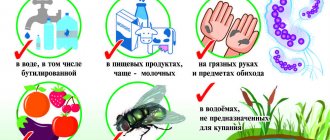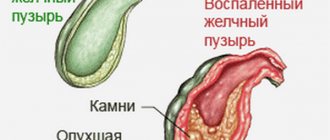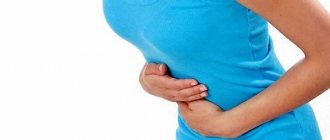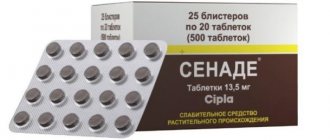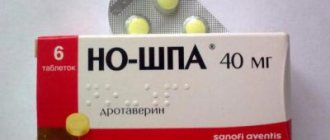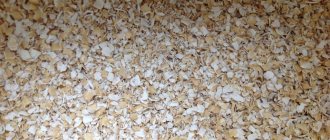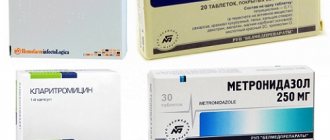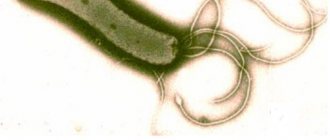Many adults and children experience digestive system disorders. In most cases, the disease is diagnosed in the summer, when personal hygiene rules and storage conditions for dairy and meat products are less observed.
There are more than thirty types of infectious agents that can affect children.
The pathological process manifests itself in the form of fever and problems with stool, against the background of which the functioning of most internal organs, and especially the kidneys, liver and intestines, can be disrupted. To eliminate the problem, specialists prescribe medications for intestinal infections.
What kind of disease is this
Intestinal infection is a group of diseases that includes more than 30 types of pathogens that act as a provoking factor in pathologies of the gastrointestinal tract.
According to statistics, the disease ranks second in prevalence and is diagnosed in 60% of patients in childhood.
The disease begins to actively develop in mid-spring, when it gets warmer. The peak incidence is observed in July, when temperatures reach high values, which becomes favorable conditions for the proliferation of pathogenic microorganisms.
Types of medications
There are several groups of medications against intestinal infections, including those for poisoning.
Antidiarrheal
In case of intoxication of the body caused by an acute form of intestinal infection, treatment should first of all be aimed at relieving clinical symptoms.
In cases where restoration of fluid loss is impossible with medications, antidiarrheal drugs of this group are prescribed.
When there is no dehydration of the body, it is recommended to simply endure this condition without the use of medications.
Most often, experts prescribe Loperamide, the action of which is aimed at slowing down intestinal motility and increasing the time during which intestinal contents pass.
Regulators that help restore water and electrolyte balance
This group includes only a small list of products that have a truly effective effect.
Among the most popular drugs are:
- sodium citrate;
- dextrose;
- sodium and potassium chloride.
The pathology is most often accompanied by symptoms such as vomiting and diarrhea, as a result of which a large amount of fluid is lost and the water-salt balance is disrupted.
These signs are the most dangerous for the human body, since against the background of this condition the risk of dehydration increases. It is for this reason that the main task of therapy is to restore lost reserves.
In this case, there is nothing complicated - how much fluid was lost, the same amount should enter the body through taking medications or drinking medicinal mineral water.
If it is not possible to take rehydrants orally, they are administered using a dropper.
Absorbents
It is not always necessary to take drugs from the sorbent group. Theoretically, they provide a link to toxins, preventing them from binding to intestinal membranes.
However, to ensure that drugs work, they must enter the patient’s body before toxins attach to the mucosa.
It is not possible to achieve such an effect in practice in all situations. Even with timely administration, it is not always possible to prevent the process of dehydration, despite less excretion of feces.
Antibacterial
The effect of the drugs will only be observed if an infection caused by pathogenic bacteria is diagnosed. If the poisoning was caused by viruses, then the effect will not occur, in which case it is necessary to use antiviral drugs.
The most commonly prescribed antibiotics for treatment are:
- Doxycycline;
- Metronidazole;
- Ofloxacin;
- Levomycetin.
Carrying out therapeutic measures with antibacterial drugs is indicated only with the prescription of the attending physician, when the type of causative agent of the disease has been determined.
Painkillers
For adults, when a pronounced pain syndrome appears, experts recommend taking drugs from this group. To alleviate the condition, Spazmaton, No-Shpa or Benalgin may be prescribed.
Restorative
To restore the intestinal microflora, probiotics and prebiotics are often used. These drugs differ in their principle of action. In the first case, beneficial bacteria are introduced.
If the restoration process is quite effective, then their engraftment and active division are noted. The preparations may contain from one to several cultures.
However, it is important not to forget that they should not be taken at the same time as antibiotics, since the effect in this case will be significantly reduced.
If you are predisposed to developing an allergic reaction or decreased immunity, prebiotics are prescribed. Their impact leads to the fact that the body begins to independently produce beneficial bacteria.
Emergency medications for intestinal infections
Providing first aid and immediately taking tablets for intestinal infections is required in situations where defecation occurs more than 8 times a day, while the stool is liquid and in appearance may resemble rice water, and also when signs of general intoxication of the body are clearly visible.
In this case, you need to take the following medications for intestinal infection:
- Intravenous infusion of an isotonic solution of sodium chloride and glucose.
- Intramuscular injections of a lytic mixture consisting of 2 ml of Analgin, 2 ml of Papaverine and 1 ml of Diphenhydramine.
- The use of adsorbents and rehydration preparations in powder form, such as Regidron and Polysorb. This will protect the body from dehydration, and the adsorbent will help remove toxins.
In severe cases, hospitalization in the infectious diseases department of the hospital is required. Medicines for children prescribed for intestinal infections must meet safety requirements, quickly replenish water and electrolyte balance, and also remove waste products of pathogenic microflora from the body within a short time after taking them.
The most effective drugs
The list of the most effective remedies includes medications from several groups at once.
Regidron
Its action is aimed at restoring the acid-base balance, the disruption of which is inevitable with diarrhea and severe vomiting.
The medicine is available in the form of a powder consistency. To use, you need to dilute one sachet in a liter of boiling water. After the resulting solution has cooled, it should be drunk, shaking well each time.
Regidron is used only with a doctor's prescription. The dose is calculated individually for a child and an adult. In this case, it is not the patient’s age category that is taken into account, but his body weight.
Drink the medicine every 60 minutes - 10 milliliters per kilogram of weight. After diarrhea or vomiting, an additional portion is needed.
This product has no side effects.
Contraindications include:
- diabetes;
- high blood pressure;
- renal failure;
- excess potassium.
Instead of Regidron, you can use Trihydron, Hemodez, salted water or saline solution.
Levomycetin
Belongs to the group of bacteriostatic antibiotics. Pharmaceutical companies produce the drug in tablet form. Its main substance is chloramphenicol.
Adults are prescribed 250-500 mg 30 minutes before meals. Child 3-8 years old - 125 mg in the morning, afternoon and evening. Duration of therapy is up to one and a half weeks. The drug is contraindicated when diagnosing influenza, psoriasis, renal failure, as well as during pregnancy.
Arbidol
The basis of the drug is umifenovir. It is prescribed for the development of acute intestinal infection in both adults and children. Dosage – 1 capsule. It is not recommended to give to children under three years of age, as well as those with hypersensitivity to the components.
Enterofuril
Its effective action is observed only in the intestines; it is not absorbed from the gastrointestinal tract.
The antibiotic is aimed at suppressing the growth of many pathogenic microorganisms and has virtually no adverse reactions.
After consuming Enterofuril, the active substance begins to actively accumulate in the intestines, as a result of which the vital activity of gram-negative and gram-positive bacteria is suppressed.
Not assigned:
- children under the age of one month, as well as premature babies;
- with congenital enzyme deficiency;
- with hypersensitivity to 5-nitrofurans.
The drug is available in the form of a suspension or capsules.
Furazolidone
Refers to an intestinal antibiotic that suppresses the reproduction and growth of pathogenic bacteria. In addition, the medication has an antimicrobial effect.
Furazolidone is prescribed when the pathology is accompanied by diarrhea and vomiting.
Main contraindications:
- individual intolerance;
- age up to three years;
- end-stage renal failure;
- deficiency of glucose-6-phosphate dehydrogenase.
Also, Furazolidone is not prescribed to newborns and infants.
Side effects include allergies and problems with assimilation and digestion of food.
How to restore intestinal flora
Often, after treatment with drugs for intestinal infections, dysbiosis occurs in adults and children, which probiotics help to cope with.
This group of drugs includes drugs that help fight intestinal infections by populating the gastrointestinal tract with beneficial microflora: lactobacilli, bifidobacteria and enterococci.
Types of probiotics:
- 1st generation – single-component medications that contain one type of microorganisms (Lactobacterin, Bifidumbacterin);
- 2nd generation - antagonists with the ability to self-eliminate (Baktisubtil, Sporobacterin)
- 3rd generation – multicomponent probiotics (Acipol, Linex, Atsilact);
- 4th generation – living representatives of natural microflora, placed on a sorbent substance (Floritin Forte, Probifor).
Medicines from this group are used in complex therapy of intestinal infections in children and adults.
Symptoms of an infectious disease in the intestines are hyperthermia, severe diarrhea, general weakness, abdominal pain and signs of intoxication. Intestinal infection is highly treatable in adults and children with timely consultation with a doctor and taking appropriate medications.
To avoid harming yourself, you should not self-medicate, as severe dehydration can cause serious complications.
Author: Violeta Kudryavtseva, doctor, especially for Zhkt.ru
Inexpensive means
Among the cheapest and most effective medications that help cope with the disease are:
- Smecta (about 15 rubles per sachet);
- Polyphepan;
- Filtrum STI;
- Lactobacterin;
- Bifidobacterin;
- Loperamide;
- Phthalazol;
- Furazolidone.
Any of the listed remedies can be taken only after consultation with a specialist.
Symptoms of intestinal flu
The latent period from the moment of infection to the appearance of the first symptoms lasts from 1 to 5 days. In isolated cases, it can be about 15 hours if a severely weakened organism is attacked by the pathogen. If the rotavirus fails to penetrate the cells, the disease develops asymptomatically.
After infection with rotavirus, antibodies are formed in the body, which form immunity to a certain type of virus. Unfortunately, this does not protect against future diseases. But if infection occurs with the same type of rotavirus, then intestinal flu will occur in a milder form. The acute period is usually about 4 days, and in general the disease lasts about two weeks.
In the first days, signs of a respiratory disease appear: the patient may complain of a runny nose, sore throat, redness of the throat, and cough. Symptoms of gastrointestinal distress occur later. For this reason, the infectious disease is often called intestinal or stomach flu. In some cases, all symptoms develop simultaneously.
Typical features of rotavirus infection:
- Headache, general weakness, lethargy. The patient's appetite worsens or is absent. In adults, intoxication manifests itself slightly, most often in the form of weakness.
- Attacks of vomiting, which are perceived as a consequence of food poisoning.
- Frequent diarrhea. The feces are watery, pale yellow or white coated, with a pungent odor. Urine is dark in color and may contain traces of blood.
- Spasmodic pain in the epigastric region and navel area.
- Strong rumbling in the stomach.
- In children, the temperature increases; in adults, it is within normal limits or increases slightly.
- Dehydration of the body, decreased amount of urine excreted.
Due to the mildness of symptoms in adults, malaise is most often mistakenly perceived as food poisoning. Therefore, they rarely turn to doctors, preferring to cope with the disease on their own. But this does not mean that patients are not dangerous to others. In fact, they are the source of the spread of rotavirus.
What medications can be taken for preventive purposes?
As mentioned above, the development of pathology is most often observed in the summer, when most people go to the sea and spend a lot of time traveling.
In order not to spoil your holiday, it is recommended to take prebiotics and probiotics as a preventive measure for the disease. They contain many beneficial bacteria that have a beneficial effect on the intestinal microflora.
To maintain the immune system, vitamin therapy and taking herbal medications are useful.
Complications in the absence of therapy
If the necessary therapeutic measures are not taken, the risk of developing negative consequences increases significantly. Lack of treatment can provoke acute renal failure, hypovolemic shock, sepsis, pulmonary edema, acute heart and vascular diseases and infectious-toxic shock.
There are many drugs that can be prescribed to treat pathology. Some of them can be taken independently, others are used only with a doctor’s prescription.
It is not recommended to self-medicate, especially if the pathology occurs in a child . Any wrong action can lead to more serious consequences. If symptoms of the disease appear, it is better to immediately seek medical help.
